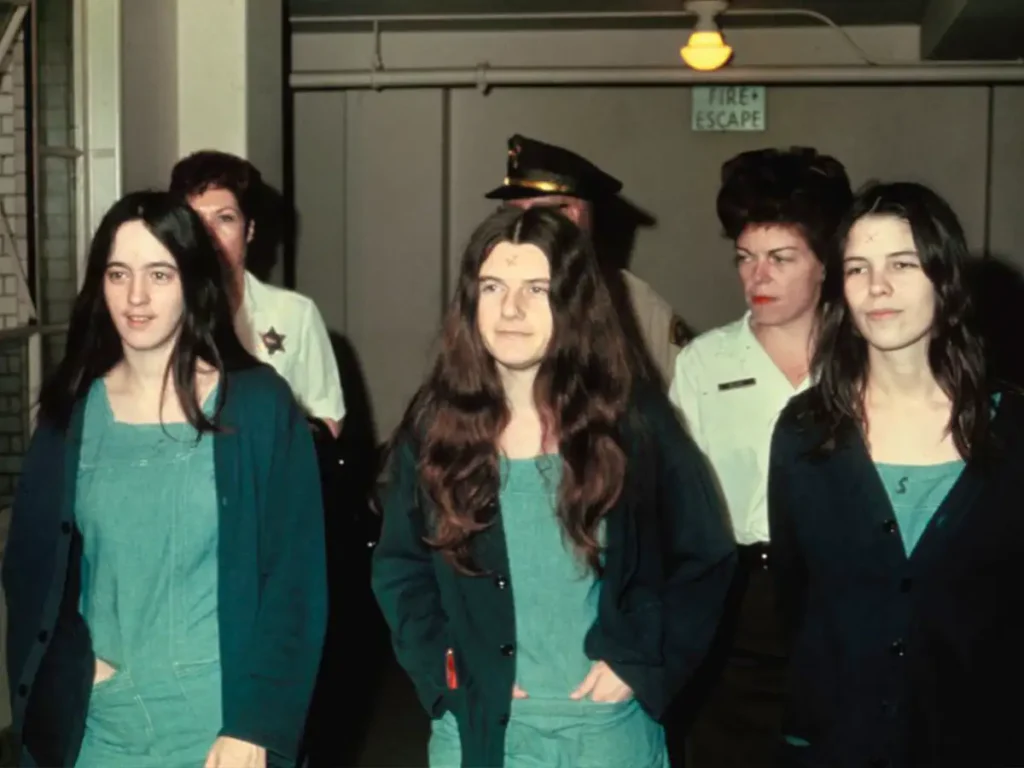Where are they now: Manson Family Women

Following the release of Leslie Van Houten on parole in June 2023, public attention once again turned to the heinous crimes committed by Charles Manson and his followers over five decades ago. Charles Manson’s murders were aided by five significant women. The decision to grant parole to one of the women, Leslie Van Houten reignited debates about the nature of her involvement, the impact of the Manson Family cult, and the notion of rehabilitation and redemption. This article delves into their current situations.
In August 1969, Charles Manson orchestrated Tex Watson, Susan Atkins, Linda Kasabian, and Patricia Krenwinke to attack the residence of Sharon Tate and Roman Polanski. The motive was revenge against the house’s previous resident, record producer Terry Melcher, who had rejected Manson’s music aspirations. Manson ordered his followers to “totally destroy everyone in it” in a gruesome manner.
While Polanski was absent, pregnant Sharon Tate and her friends were present when the followers arrived. The victims were fatally shot, and ‘Pig’ was written in blood on the door as a macabre message. The following night, the same group, along with Leslie Van Houten and Manson, struck again, this time at the home of Leno and Rosemary LaBianca.
In August, Donald ‘Shorty’ Shea, a ranch hand at the Family’s living quarters, was also murdered. However, it wasn’t until October 1969 that Manson and several followers were arrested. Initially, they were detained for stealing RV equipment, but later they were linked to the Tate-LaBianca murders, leading to their arrest warrants.
In 1971, the high-profile trial began, and all five were sentenced to death for their roles in the killings. Later, their sentences were commuted to life imprisonment as California abolished the death penalty.
Leslie Van Houten was released in June 2023, now in her 70s, and had spent 53 years in custody, repeatedly seeking parole and facing opposition from victims’ families and various governors. Despite the passage of time, the memories of the brutal murders continue to haunt the victims’ loved ones and many Californians.
She joined the Manson Family in her teens after facing drug problems and running away from home. Initially sentenced to death, her punishment was later changed to life imprisonment. In June 2023, at the age of 73, she was released on parole after serving 53 years in prison.
Governor Gavin Newsom’s decision not to challenge the state appellate court’s ruling, which led to Van Houten’s parole, stirred emotions among those affected by the Manson cult’s reign of terror. Some saw it as a necessary step toward rehabilitation and second chances, while others viewed it as an affront to justice and a threat to public safety.
Throughout her time in prison, Van Houten underwent numerous courses aimed at addressing her actions and taking responsibility for the heinous crimes she committed as a young woman under the influence of Charles Manson’s manipulative charisma. She earned bachelor’s and master’s degrees in humanities, reflecting her commitment to self-improvement during her decades of incarceration.
Nevertheless, many victims’ families and advocates believe that Van Houten’s role in the Manson murders should forever define her fate. They argue that her release sets a dangerous precedent and fails to acknowledge the gravity of her actions and the devastating consequences they had on innocent lives.
Now, let’s see what happened to the other women after their involvement with the Manson Family cult:
Susan Atkins played a significant role in the murder of Sharon Tate and is suspected to have written on the walls using Tate’s blood. During her time in prison, she maintained good behavior and even got married twice. Susan Atkins also contributed by teaching fellow inmates, and she made multiple attempts to secure parole. Tragically, she passed away in 2009 due to a brain tumor, making her the longest-serving woman in California’s prison history.
Patricia Krenwinkel was a loyal disciple of Manson, and she spoke of her life with the Family as perfect. Found guilty of killing Abigail Folger, she was sentenced to life in prison, and despite multiple efforts, she has not been able to obtain parole. Patricia Krenwinkel currently holds the distinction of being the longest-serving woman in California’s correctional facilities.
Lynette “Squeaky” Fromme, despite not being directly involved in the murders, gained notoriety for guiding Manson Family members in camping outside the courthouse, their foreheads marked with carved Xs. In 1975, she made an assassination attempt on President Gerald Ford. After serving close to 34 years, she was granted parole in 2009 and is rumored to be currently employed as a real estate agent.
Linda Kasabian became a member of the Family shortly before the Tate-LaBianca killings, but she did not directly take part in the murders. In return for providing testimony against Manson and his followers during the trial, she received immunity. However, she encountered legal issues later on due to drug possession. Sadly, she passed away at the age of 73 in January 2023, residing in Washington State under the name “Chiochios” to safeguard her identity.
Charles Manson’s crimes and the involvement of these key women remain one of the most infamous chapters in American history. The debate surrounding the Manson Family cult and its members remains complex and polarizing. On one hand, there are those who advocate for rehabilitation and the possibility of redemption, emphasizing that individuals can change over time and should be given opportunities to re-enter society as contributing members. On the other hand, there are those who argue that certain crimes are so heinous that they warrant permanent punishment, with no possibility of parole or redemption.
Regardless of one’s stance on the matter, the Manson Family’s crimes serve as a haunting reminder of the potential for evil and the destructive power of manipulative leaders. The legacy of Sharon Tate, Jay Sebring, Leno, Rosemary LaBianca, and the other victims continue to live on in the hearts of those who knew and loved them.
As we move forward, it is essential to remember the lessons of history and strive for a society that emphasizes empathy, compassion, and accountability while seeking to prevent such tragedies from ever happening again. The Manson Family cult’s impact may endure, but it is through dialogue, understanding, and a commitment to justice that we can honor the memories of the victims and work towards a safer and more compassionate world.







Have your say